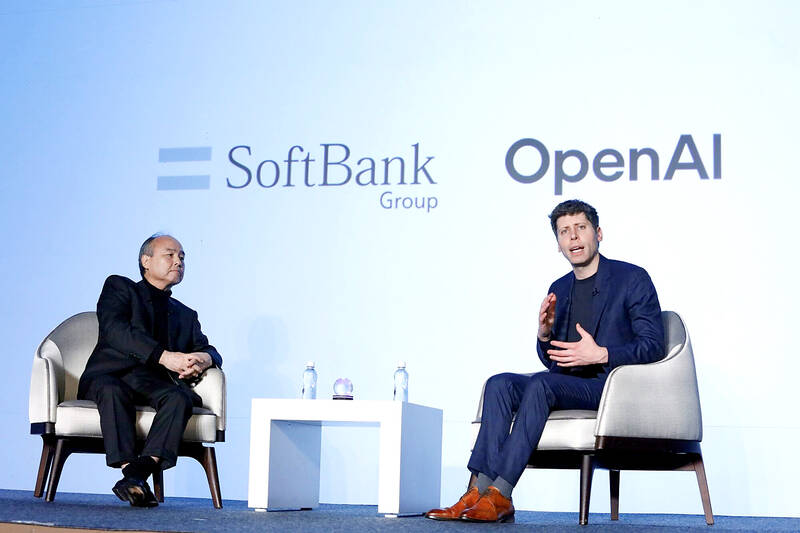Softbank Group Corp and OpenAI would create a joint venture to develop and sell artificial intelligence (AI) services to businesses across Japan, establishing one of the broadest efforts yet to sell the fast-growing start-up’s tools to enterprise customers outside of the US.
Billionaire Softbank founder Masayoshi Son and OpenAI CEO Sam Altman took to a Tokyo stage yesterday to outline their 50-50 collaboration. The venture, which would operate under Softbank’s telecom arm Softbank Corp, would hire 1,000 people from Softbank to market OpenAI products to industries from automakers to retailers.
Softbank said its own group companies — including LY Corp and PayPay Corp — would collectively use the US company’s tools to the tune of about US$3 billion a year.

Photo: Bloomberg
The tie-up underscores Softbank’s emergent role in driving AI development around the world, from leading the US$100 billion Stargate endeavor in the US to a years-long effort to build data centers in its home country of Japan.
“If more is better, we should do a lot. More brain is definitely better,” Son said.
He then made an apparent nod to the popularity of Chinese start-up DeepSeek’s cheaper AI model now challenging the premise underpinning the need for big AI spending.
“Some people say you can do small — compressed — but that’s just small,” he said.
Softbank joins a growing roster of tech leaders including Meta Platforms Inc and Microsoft Corp that are spending billions of dollars to lay the foundation for future AI development and use.
“The world is going to need so much compute,” Altman said, painting an imminent future of AI breakthroughs in healthcare and robotics.
“The most value will be made at the very front of that frontier,” he said.
Shares of Softbank closed up 0.5 percent yesterday, erasing losses at the beginning of the day.
Softbank is teaming up with OpenAI, Oracle Corp and Abu Dhabi-backed MGX on a multibillion-dollar project to build data centers and infrastructure in the US for the ChatGPT creator. The Stargate Project plans to spend at least US$500 billion over the next four years to build more computing power.
Japan, which largely missed the initial wave of growth from the Internet, cannot afford to lose another three decades, Son has said.
However, the resource-poor country remains constrained by the high price of imported oil and gas, while public sentiment is wary about nuclear power following the 2011 Fukushima meltdowns in a country that experiences hundreds of noticeable quakes a year.
Son yesterday brought a purple crystal onto the stage, an allusion to a metaphor he used when he bought Arm in 2016 as a means to see into the future of technology. The joint venture would market an enterprise AI called “Cristal intelligence” for Japanese companies, Son said.
Son and Altman were scheduled to meet with Japanese Prime Minister Ishiba Shigeru. The pair were joined at yesterday’s press briefing by Arm CEO Rene Haas and Junichi Miyakawa, head of Softbank’s telecom arm.

CAUTIOUS RECOVERY: While the manufacturing sector returned to growth amid the US-China trade truce, firms remain wary as uncertainty clouds the outlook, the CIER said The local manufacturing sector returned to expansion last month, as the official purchasing managers’ index (PMI) rose 2.1 points to 51.0, driven by a temporary easing in US-China trade tensions, the Chung-Hua Institution for Economic Research (CIER, 中華經濟研究院) said yesterday. The PMI gauges the health of the manufacturing industry, with readings above 50 indicating expansion and those below 50 signaling contraction. “Firms are not as pessimistic as they were in April, but they remain far from optimistic,” CIER president Lien Hsien-ming (連賢明) said at a news conference. The full impact of US tariff decisions is unlikely to become clear until later this month

With an approval rating of just two percent, Peruvian President Dina Boluarte might be the world’s most unpopular leader, according to pollsters. Protests greeted her rise to power 29 months ago, and have marked her entire term — joined by assorted scandals, investigations, controversies and a surge in gang violence. The 63-year-old is the target of a dozen probes, including for her alleged failure to declare gifts of luxury jewels and watches, a scandal inevitably dubbed “Rolexgate.” She is also under the microscope for a two-week undeclared absence for nose surgery — which she insists was medical, not cosmetic — and is

GROWING CONCERN: Some senior Trump administration officials opposed the UAE expansion over fears that another TSMC project could jeopardize its US investment Taiwan Semiconductor Manufacturing Co (TSMC, 台積電) is evaluating building an advanced production facility in the United Arab Emirates (UAE) and has discussed the possibility with officials in US President Donald Trump’s administration, people familiar with the matter said, in a potentially major bet on the Middle East that would only come to fruition with Washington’s approval. The company has had multiple meetings in the past few months with US Special Envoy to the Middle East Steve Witkoff and officials from MGX, an influential investment vehicle overseen by the UAE president’s brother, the people said. The conversations are a continuation of talks that

Alchip Technologies Ltd (世芯), an application-specific integrated circuit (ASIC) designer specializing in artificial-intelligence (AI) chips, yesterday said that small-volume production of 3-nanometer (nm) chips for a key customer is on track to start by the end of this year, dismissing speculation about delays in producing advanced chips. As Alchip is transitioning from 7-nanometer and 5-nanometer process technology to 3 nanometers, investors and shareholders have been closely monitoring whether the company is navigating through such transition smoothly. “We are proceeding well in [building] this generation [of chips]. It appears to me that no revision will be required. We have achieved success in designing